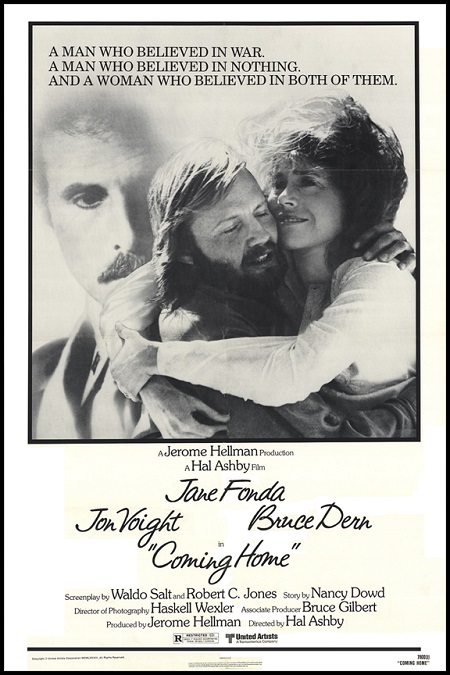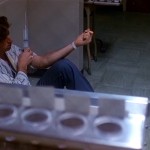
Coming Home – 1978
Once again, I am impressed with Jane Fonda as she takes the lead in a very dramatic film. And this one sure is a whopper, as it deals with a very difficult subject matter. Its plot is told from the perspective of a woman whose husband is going to Vietnam. She stays home and volunteers at a Veteran’s Association hospital. While there, she meets and falls in love with a paraplegic. She has an affair with him and has to deal with the consequences when her husband returns.
Fonda plays Sally Hyde, the unfaithful wife. Her husband, Captain Bob Hyde, is played by Bruce Dern. The man she has her affair with is Luke Martin, played by Jon Voight. There was nothing about this movie that was easy or light-hearted. It was some pretty deep and serious drama. The story was a good one, though not much really happened until about half-way through the film.
And when that turning point came, it came not from the main story or the big name characters. The film’s drama shifted into high gear when a seemingly unimportant sub-plot took a deadly turn. Sally’s roommate, Vi Munson, played by Penelope Milford, has a brother named Bill, played by Robert Carradine, who had spent only 2 weeks in Vietnam before coming back home with serious mental and emotional damage.
The film was going along just fine. Captain Hyde had gone off to war and Sally was trying to resist giving in to Luke’s advances. Meanwhile, Sally, Luke, and Vi, spent time with Bill whenever they could. But then, one day, after Luke has left the hospital to return to the real world, Bill has an episode of extreme depression and commits suicide by injecting air into his veins. That one really took me by surprise.
After that, the already serious tone of the film turned even more serious and depressing. Sometimes the dialogue turned a little preachy in its anti-war sentiments, but it wasn’t just hot air. I say that because I happen to agree with most of what was said, though I also think that there are times when war is a necessary evil that can bring about change like nothing else can. But I’m not trying to debate philosophy.
The point I’m trying to make is that no matter what your opinion about the moral implications of war might be, there is an absolute truth when it comes to war. Some people die. Others are wounded. The wounds can be physical or emotional. But nobody who goes to war comes home the same as when they left. And I think that was the point of the movie, in a nutshell.
But there was more drama still to come when Bob returned home. I was reminded of the 1946 Best Picture winner, The Best Years of Our Lives, a film that had much the same message. Bob returns to find a strange emotional distance between himself and Sally. And then, when he learns of her affair, he loses his mind and nearly murders Sally and Luke. In the end, he commits suicide by stripping naked and swimming out into the ocean until he drowns.
The script was just bursting with Oscar potential. It was deeply emotional, and you could tell that both the actors and the director, Hal Ashby, were passionate about what they were doing. In fact, Voight and Fonda both took home Awards for Best Actor and Actress that year. Also, Waldo Salt, Robert C. Jones, and Nancy Dowd, won for Best Original Screenplay.
I have to take a moment to really recognize Voight for an inspired performance. He created a very real character. There was subtlety and depth in his performance. Luke was a good man whose life had been irrevocably changed by a war he never even believed in. He was bitter and angry, and yet he was trying to be a good man who did the right things, despite the wrongs that had been done to him.
In his final scene, interspersed with scenes of Bob’s suicide, is a scene where Luke is talking to a group of young students about his experiences in Vietnam. He says, “I don’t see any reason for it. And there’s a lot of shit that I did over there that I find fucking hard to live with. And I don’t want to see people like you, man, coming back and having to face the rest of your lives with that kind of shit. It’s as simple as that.”








